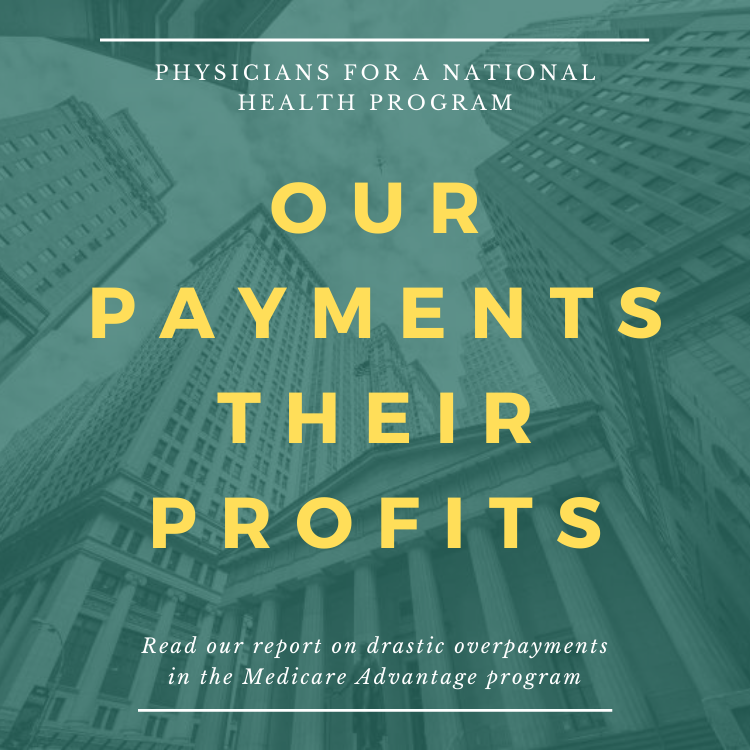Only an improved Medicare for All can rein in costs and provide quality, universal care, says Physicians for a National Health Program
FOR IMMEDIATE RELEASE
Dec. 1, 2010
Contact:
Margaret Flowers, M.D.
Garrett Adams, M.D., M.P.H.
Quentin Young, M.D.
Mark Almberg, PNHP, (312) 782-6006, mark@pnhp.org
Proposed changes to Medicare unveiled by the co-chairs of the Deficit Commission, including their proposal to increase out-of-pocket payments by Medicare beneficiaries, won’t control health costs but will hurt patients and should be rejected, a national physicians’ group said today. The only effective way to rein in costs is through an improved Medicare-for-All program, they said.
“The co-chairmen’s plan to impose increased cost-sharing on Medicare beneficiaries is the wrong medicine,” said Dr. Margaret Flowers, congressional fellow for the 18,000-member Physicians for a National Health Program.
“Seniors and people with disabilities in the Medicare program already face substantial financial barriers to care in the form of existing co-payments and deductibles,” she said. “For example, recent research shows the 25 percent of Medicare beneficiaries with the highest spending spend at least 30 percent of their income on health care.
“Raising these financial barriers still further with increased deductibles and co-insurance costs will result in seniors delaying or forgoing doctor visits and other needed care, while increasing the incidence of costly hospitalizations. Greater out-of-pocket expenses will also increase the economic hardship faced by their families.”
“Medicare is not the cause of rising health care costs but its victim,” she said. “The real culprit for skyrocketing costs is our irrational, fragmented, market-based model of paying for health care, which chiefly benefits the private health insurance industry and Big Pharma, not patients or physicians. The commission co-chairs are silent on this matter.”
Flowers continued: “Rising health costs can be reined in, but only if we adopt a single-payer, Medicare-for-All program. Such a program would slash $400 billion annually in administrative waste associated with our present private-insurance model of financing care, enough to cover the 50 million uninsured and to eliminate everyone’s co-pays and deductibles. It would also employ proven single-payer cost-control tools like the ability to negotiate drug prices and provider fees and to set global budgets for hospitals.”
She continued: “Enacting an improved Medicare for all is the only rational, evidence-based way to control costs, in contrast with the co-chairs’ proposals. The latter would simply shift the problem of rising costs onto vulnerable seniors at the time they need care – precisely when they are least able to navigate the complex health system.”
Noting that some commission members favor privatizing the Medicare program by giving seniors vouchers to buy skimpy private coverage, Flowers said that this would also shift costs onto Medicare beneficiaries, because the value of the vouchers would fall over time as health care costs rise faster than the value of the coupons.
“Vouchers or so-called premium supports don’t control costs, they shift them to the sick,” she said.
“Studies also show that per capita health costs are rising more slowly for those on Medicare than for those with private health insurance, so pushing more seniors into the clutches of the private insurers will only accelerate rising costs,” she said. “Private, for-profit Medicare Advantage plans are also 13 percent more costly than traditional Medicare, due in large part to their higher administrative costs, including lavish CEO salaries.”
She said the proposed cuts in Medicare payments to hospitals for medical education will harm the training of badly needed primary care doctors and the primary care infrastructure, and will disproportionately hurt safety-net hospitals and other hospitals that serve large numbers of the poor.
Flowers said her group has deep concerns about the co-chairs’ other proposals pertaining to Medicare, Medicaid and Social Security, most of which would place even greater financial burdens on backs of the nation’s working population, the poor and the sick.
She said the new federal health law, despite some of its beneficial provisions, perpetuates the private-insurance-based model of financing care and therefore effectively precludes real cost control and universal coverage.
“The fundamental solution to our health care woes is an improved Medicare for All,” Flowers said. “The evidence shows a single-payer national health insurance program will save lives and save money. It will be financially sustainable. An improved Medicare for All will put our nation on the path of becoming one of the best health systems in the world.”
Physicians for a National Health Program (www.pnhp.org) is an organization of 18,000 doctors who support single-payer national health insurance. Dr. Flowers testified before the National Commission on Fiscal Responsibility and Reform at its public forum on July 6, 2010, and her testimony can be found here. To speak with a physician/spokesperson in your area, visit www.pnhp.org/stateactions or call (312) 782-6006.
